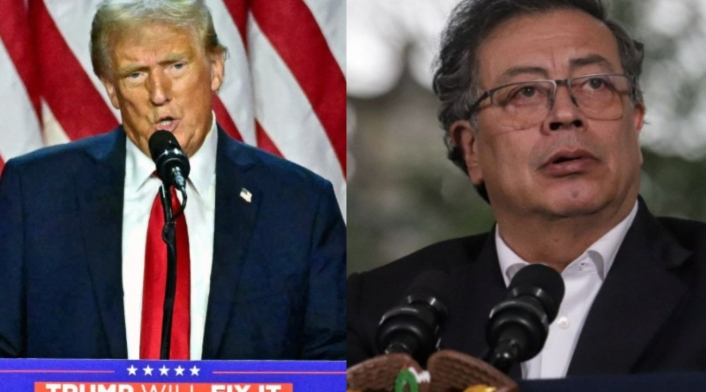In a dramatic escalation of diplomatic tensions, U.S. President Donald Trump and Colombian President Gustavo Petro have exchanged sharp rhetoric over Colombia’s refusal to accept two U.S. military flights carrying deported Colombian migrants. Trump, in a post on Truth Social, announced sweeping retaliatory measures against Colombia, while Petro fired back on social media, denouncing Trump’s policies and defending Colombia’s sovereignty.
Trump’s Retaliatory Measures
Trump accused Petro of jeopardizing U.S. national security by denying entry to the deportation flights, which he claimed carried “illegal criminals.” In his statement, Trump described Petro as an unpopular socialist leader and outlined immediate punitive actions:
- 25% Tariffs on Colombian Imports: Effective immediately, all Colombian goods entering the U.S. are subject to a 25% tariff, with plans to increase the rate to 50% within a week if the issue remains unresolved.
- Visa Sanctions: The U.S. will impose a travel ban and revoke visas for Colombian government officials, their allies, and their families.
- Enhanced Inspections: All Colombian nationals and cargo entering the U.S. will face heightened customs inspections.
- Financial Sanctions: Treasury, banking, and financial restrictions under the International Emergency Economic Powers Act (IEEPA) will be implemented.
“These measures are just the beginning,” Trump warned. “We will not allow the Colombian Government to violate its legal obligations with regard to the acceptance and return of the criminals they forced into the United States!”
Petro’s Defiant Response
Petro responded on the platform X (formerly Twitter) with a lengthy and impassioned message, rejecting Trump’s actions and defending Colombia’s stance. Petro condemned the U.S. practice of deporting migrants on military aircraft, arguing it dehumanizes them. “The U.S. cannot treat Colombian migrants as criminals,” he wrote.
In a broader critique of Trump’s policies and attitudes, Petro painted a picture of Colombia as a nation steeped in history, culture, and resilience. He rejected Trump’s characterization of Colombians and accused the U.S. of perpetuating policies rooted in greed and oppression.
Petro’s statement included sharp rebukes:
- He criticized Trump’s economic retaliation, vowing to impose reciprocal tariffs on U.S. goods.
- He accused Trump of treating Colombians as an “inferior race” and likened the current U.S. policies to historic acts of oppression.
- He underscored Colombia’s identity as a nation of freedom, resilience, and cultural heritage, referencing figures like Bolívar and historical struggles against imperialism.
“Trump, if you’re looking for someone stubborn, that’s me,” Petro wrote. “Your blockade does not scare me. Colombia, the country of beauty, is the heart of the world.”
Broader Implications
The feud between the two leaders has raised concerns about the future of U.S.-Colombian relations, which have traditionally been strong due to shared interests in counter-narcotics efforts and trade. Colombia is a key exporter of goods like coffee, flowers, and oil to the U.S., and Trump’s tariffs are expected to significantly impact its economy.
Meanwhile, Trump’s critics argue that using military aircraft for deportations conflates migration with criminality, drawing backlash from human rights advocates. “Deporting migrants on military planes sends a dangerous message,” said Ana Pérez, spokesperson for an immigration rights organization.
The standoff has also exposed ideological rifts, with Petro positioning himself as a defender of Latin American sovereignty and dignity. “Colombia now turns its gaze away from the North and toward the world,” he declared, calling for unity among Latin American nations and distancing Colombia from U.S. influence.
What’s Next?
Both leaders appear unwilling to back down, setting the stage for prolonged tensions. Trump has promised additional measures, while Petro has signaled Colombia’s readiness to withstand U.S. pressure. The situation underscores a growing divide over migration policy and international relations, with the outcome likely to have economic and political repercussions far beyond the two nations.
Observers warn that the escalating dispute could disrupt trade, deepen mistrust, and complicate broader regional diplomacy, as Latin America increasingly questions its relationship with the United States.
A global media for the latest news, entertainment, music fashion, and more.





